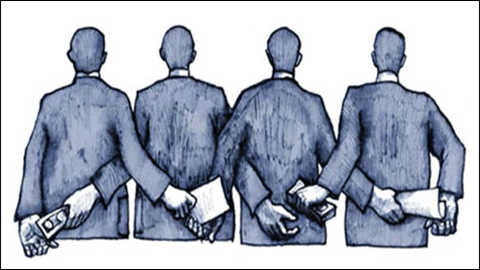 (This image of political corruption is from uab.cat.)
(This image of political corruption is from uab.cat.)We have laws in this country about political donations. When those laws are violated, the Federal Election Commission issues fines to the violators -- both the politicians receiving the donations and the groups giving the illegal donations. Unfortunately, there aren't enough teeth in those laws, because too many politicians and groups are just ignoring the fines and refusing to pay them -- and they are not being punished for it.
Here is part of an article on this unethical behavior by David Levinthal at the Center for Public Integrity:
In July 2016, the Federal Election Commission slapped the 60 Plus Association with a $50,000 fine, charging that it hadn’t revealed its donors as legally obliged. The penalty — along with fines assessed to two other politically active nonprofit groups likewise connected to billionaire brothers David and Charles Koch — represented one of the most decisive decisions this decade at an FEC best known for intramural bickering and ideological gridlock. Government reformers rejoiced. But 15 months later, the Virginia-based 60 Plus Association has only paid one-tenth of its fine. Chairman Jim Martin says the senior advocacy group, which backs “free enterprise, less government” while supporting conservative politicians, has no plans to pay more. The FEC, meanwhile, isn’t forcing the 60 Plus Association’s compliance — or anything close. The 60 Plus Association has plenty of debt-dodging company: More than 160 political committees and similar groups together owe the government more than $1.3 million worth of unpaid fines, according to a Center for Public Integrity analysis of Federal Election Commission and U.S. Treasury records since 2000. Some of those unpaid fines amount to as little as $10 while others soar into five figures. Many cases concern all-but-forgotten also-ran political candidates, but others involve political luminaries — the Rev. Al Sharpton, MSNBC host Joe Scarborough and Green Party presidential nominee Jill Stein, among them. Super PACs and politically active nonprofits have joined the nonpayment parade of late. And there’s little evidence any of that cash will soon begin to roll in. Uncooperative political committee leaders, bureaucratic bumbling and flaccid fine enforcement efforts all contribute to election law breakers outrunning penalties during a time when campaign shenanigans — from Russian advertisements to government contractors bankrolling super PACs — are increasingly brazen and sophisticated. The situation “reinforces the view of many political actors that there really isn’t a sheriff in town,” said Adam Rappaport, chief counsel for Citizens for Responsibility and Ethics in Washington, which filed a complaint against the 60 Plus Association that prompted the FEC’s fine. “Political actors feel confident and comfortable that the FEC will not enforce campaign finance laws against them.”. . . How to beat an FEC fine A Center for Public Integrity review of dozens of political committees’ election violation case files and interviews with FEC, U.S. Treasury and political committee officials shows how political committees typically avoid payment:
- Offenders often just begin by waiting 180 days after the FEC makes its final ruling on the fine, and ignoring the FEC’s strongly-worded letters. The FEC has no unilateral power to seize a political committee’s assets, and it rarely sues in federal court. Generally, Walther says, such legal action is too costly and time-consuming. The FEC isn’t allowed to pocket fine money derived from its own enforcement actions — cash it collects goes straight to the U.S. government’s general fund. “We can’t justify the expense,” Walther said.
- If there’s no payment after 180 days, the FEC itself gives up and refers the debt to its de facto collection agent, the U.S. Treasury’s Bureau of the Fiscal Service.
- Officials at the Bureau of the Fiscal Service typically try to compel payment with more phone calls, demand letters or even referral to a private collection agency. But many offenders just ignore these efforts as well. And why wouldn’t they? Despite having the power to do so, the bureau “has not referred any debts originating with FEC to [the Department of Justice] for litigation,” said Alyssa Riedl, director of the Bureau of the Fiscal Service’s Debt Collection Program Management Directorate.
- The Bureau of the Fiscal Service then often declares the debt “uncollectable” and refers it back to the FEC. “Fiscal Service may return a debt to an agency if it determines that the cost of additional collection efforts will exceed anticipated collections,” Riedl said.
- The FEC then typically mothballs the debt, keeping it on the books but making no substantive effort to collect. “If Treasury, which has greater collection resources than the FEC, was unsuccessful, the commission has no reason to believe it would be more successful in collecting the second time around,” Walther said.

